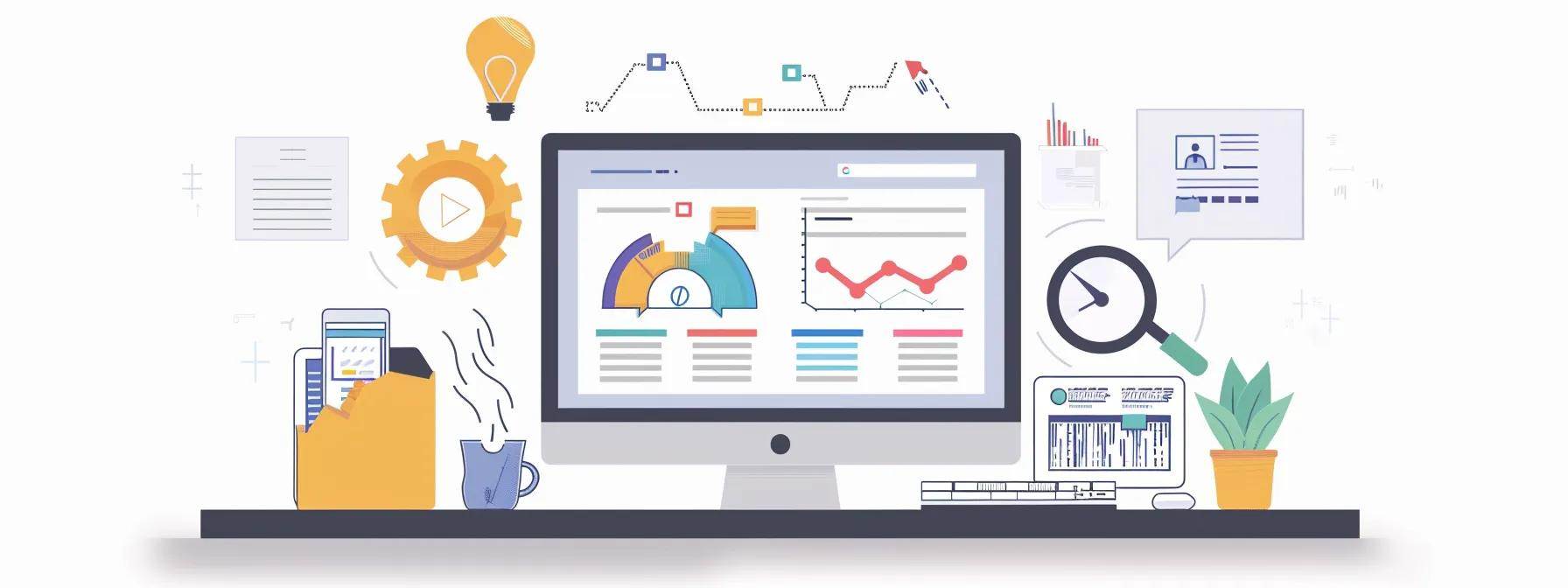Heads Up: When you purchase through links on our site, we may earn an affiliate commission at no cost to you.
Are you struggling to boost your site’s visibility in search engines while staying within budget? Many real estate investors face challenges with duplicate content, which can hurt SEO efforts. This article will explore optimizing SEO strategies using alternate pages with proper canonical tags, identify pages that need attention, and implement effective tagging strategies. Understanding and applying these concepts will enhance your site’s performance, attract more visitors, and ultimately achieve better results in your investment endeavors.
Key Takeaways
- Proper use of canonical tags improves search engine understanding of preferred content versions.
- Monitoring keyword rankings helps evaluate the effectiveness of the canonical tag implementation.
- Internal linking enhances the authority of canonical pages for better indexing.
- User experience is increasingly important for successful SEO strategies and visibility.
- Regular site assessments can identify duplicate content issues requiring canonical tag adjustments.
Understanding the Role of Alternate Pages With Proper Canonical Tag

Alternate pages are crucial in addressing duplicate content issues, which can hinder your SEO efforts. By implementing proper canonical tags in your HTML, you signal to search engines which version of a page to prioritize. This is particularly important in content marketing strategies and when managing feeds like RSS. Understanding these concepts will enhance your visibility on platforms like Google Search Console.
Defining Alternate Pages and Their Importance
Alternate pages refer to various web page versions created to serve different purposes, such as targeting specific audiences or showcasing unique content. The importance of these pages lies in their potential to create duplicate content issues, which can confuse search engines and negatively impact your site’s SEO performance. By utilizing proper canonicalization through canonical tags, you help ensure that search engines recognize the preferred version of your content, thus improving data indexing and enhancing the effectiveness of your online strategies.
The Function of Canonical Tags in SEO
Canonical tags play a significant role in SEO by informing search engines about the preferred version of a webpage, helping to eliminate duplicate content issues. When you correctly utilize the canonical HTML element, particularly in platforms like WordPress, you ensure that the search engines index the correct permalink, ultimately improving your site’s ranking. For those employing JavaScript or various content frameworks, understanding how to implement these tags effectively will enhance your site’s visibility and performance, making it easier for users to find the information they need.
Identifying Pages That Require Canonical Tags

Identifying pages that require canonical tags starts with assessing duplicate content issues that may arise in your website’s analytics. Look for similar page variants that could confuse search engines. Understanding noindex tags and hreflang attributes can clarify how you address content targeting different language audiences.
Focusing on these elements can help you determine which pages need canonical tags to optimize your SEO strategies effectively.
Assessing Duplicate Content Issues
To effectively assess duplicate content issues on your website, analyze your XML sitemaps and identify any parameters that may lead to similar content being indexed multiple times. Check for pages that may serve the same marketing purpose but have slight variations in URL structures. This evaluation will help you pinpoint where canonical tags should be applied to direct search engines toward your preferred page version, enhancing your overall SEO strategy.
Analyzing Similar Page Variants
When analyzing similar page variants, consider how features like pagination and table of contents may create multiple versions of essentially the same content. For instance, if a blog post has a similar URL structure due to pagination, implementing Yoast SEO can help you identify which version should be prioritized with a canonical tag. This ensures that search engines recognize the preferred page, streamlining your keyword research and enhancing user experience, especially if users want to print specific information from your site.
- Instant feedback
- Valuable insights
- Actionable tips
Implementing Proper Canonical Tag Strategies

Selecting the primary page for canonical tags ensures that search engines understand your content hierarchy, enhancing your site’s SEO performance. Consistency across your site architecture supports effective indexing on Google Search, guiding user behavior, and improving the feedback loop with search engines. This section will provide practical insights into these key strategies, enabling you to optimize your use of canonical tags efficiently.
Selecting the Primary Page for Canonical Tags
Selecting the primary page for canonical tags is vital in your SEO efforts, as it helps search engines recognize the most relevant version of your content. Focus on choosing pages that offer comprehensive and valuable information to your target audience so they receive the best possible user experience. By establishing a clear hierarchy through these canonical tags, you enhance your site’s indexability and improve the potential for higher rankings in search results.
Ensuring Consistency Across Your Site Architecture
Ensuring consistency across your site architecture is essential for effectively implementing canonical tags. A clear and uniform structure allows search engines to navigate your website more efficiently, making indexing the right pages easier. For example, if you have multiple pages with similar content, consistently using canonical tags will guide search engines to prioritize the page that offers the most comprehensive information, optimizing your SEO strategies.
| Key Aspect | Importance | Best Practice |
|---|---|---|
| Site Structure | Facilitates efficient indexing by search engines | Maintain a logical hierarchy of content |
| Canonical Tags | Clarifies preferred content version | Use consistently across similar pages |
| User Experience | Enhances the likelihood of user engagement | Provide valuable, easily accessible information |
Impact of Proper Canonical Tagging on SEO Performance

Proper canonical tagging significantly impacts your SEO performance. You will learn how to measure changes in search engine rankings effectively and observe shifts in site traffic. These metrics provide valuable insights into the effectiveness of your canonical strategies, ensuring your content aligns with user needs and search engine expectations.
Measuring Changes in Search Engine Rankings
Measuring changes in search engine rankings is critical to evaluating the effectiveness of your SEO strategies, especially when utilizing alternate pages with proper canonical tags. Begin by monitoring your rankings for specific keywords that relate to your content. Use tools like Google Search Console to track these shifts and correlate them with the implementation of canonical tags, ensuring you can pinpoint how well search engines recognize your pages.
| Measurement Aspect | Action | Tool |
|---|---|---|
| Keyword Rankings | Track for changes in positions | Google Search Console |
| Traffic Sources | Analyze shifts in organic traffic | Google Analytics |
| Indexing Rate | Check how many pages are indexed | Google Search Console |
Observing Changes in Site Traffic
Observing changes in site traffic after implementing proper canonical tags is vital for understanding the effectiveness of your SEO strategies. By tracking your organic traffic patterns through platforms like Google Analytics, you can identify whether your adjustments to alternate pages have increased visitors. Suppose you see higher traffic to your preferred pages. In that case, it indicates that search engines respond positively to your canonical tagging, streamlining user access to the content you want to prioritize.
Common Mistakes to Avoid With Canonical Tags

Common Mistakes to Avoid With Canonical Tags
Misconfigured canonical tags can lead to significant SEO challenges, undermining your efforts to optimize site performance. Ignoring the role of internal linking can further complicate how search engines perceive your content. This section will outline these common mistakes and offer practical insights to help you implement canonical tags effectively and elevate your SEO strategies.
Misconfigured Tags Leading to SEO Challenges
Misconfigured canonical tags can severely impact your SEO efforts, leading search engines to index the wrong page versions. For instance, if you incorrectly point multiple pages to a single canonical tag, search engines may overlook the most relevant content you intended to prioritize. To avoid these issues, regularly review your canonical tag implementations, ensuring they accurately reflect your content hierarchy and align with your optimization strategies to maintain high search visibility.
Ignoring the Importance of Internal Linking
Ignoring the importance of internal linking can confuse search engines and users, undermining your SEO efforts. Properly linking to your canonical pages helps establish their authority and relevance within your site’s architecture. By strategically using internal links, you guide search engines to the preferred versions of your alternate pages, improving indexing and enhancing overall site visibility:
- Understand the role of internal linking in SEO.
- Establish clear pathways to your primary pages.
- Regularly review your internal linking strategy.
Future Trends in SEO and Canonical Tags

The evolution of search engine algorithms continuously reshapes SEO practices, making it essential for you to stay informed. Understanding how these algorithms prioritize factors like user experience and content relevancy can significantly impact your strategy. In the following sections, you will explore the increasing importance of user experience in SEO and how these trends can inform your use of canonical tags for better optimization.
The Evolution of Search Engine Algorithms
The evolution of search engine algorithms continues to shape how you optimize your SEO strategies, particularly regarding canonical tags and alternate pages. As search engines become smarter, they increasingly prioritize user experience, relevant content, and efficient indexing. Staying updated on these algorithm changes empowers you to adjust your use of canonical tags, ensuring that search engines recognize your preferred content effectively and improve visibility in search results.
The Growing Significance of User Experience in SEO
The growing significance of user experience in SEO cannot be overstated, especially when you optimize SEO strategies using alternate pages with proper canonical tags. Search engines increasingly prioritize sites that provide a seamless and engaging experience, rewarding those that satisfy visitors. With tools like Google PageSpeed Insights, you can assess your site’s performance and make necessary adjustments, ensuring a more user-focused approach that aligns with your SEO efforts.
To enhance your understanding of this connection, consider the following steps:
- Regularly analyze page speed and mobile usability.
- Ensure your content is informative and easy to navigate.
- Implement structured data to improve content visibility.
Frequently Asked Questions
What are alternate pages in the context of SEO?
In SEO, alternate pages refer to different versions of the content created to target various geographic locations or languages. They help search engines understand which version users should see, enhancing user experience and improving site ranking.
How do I identify pages needing canonical tags?
To identify pages needing canonical tags, look for duplicate content, similar URLs, or inconsistent page versions. Use tools like Google Search Console to spot issues and effectively streamline your site’s SEO performance.
What strategies should I implement for canonical tagging?
Implement canonical tagging by specifying the preferred URL in the tag within the HTML header. This will ensure consistent content representation, avoid duplicate content issues, and improve your real estate website’s SEO rankings.
How does proper tagging influence SEO performance?
Proper tagging enhances SEO performance by improving content organization, increasing relevancy to search queries, and boosting user experience. Effective tags help search engines understand the context, ultimately driving more organic traffic to your real estate website.
What common mistakes should I avoid with canonical tags?
Using canonical tags incorrectly can harm your SEO strategy. Common mistakes include not using them consistently, failing to update them when content changes, and overlooking duplicate content. Always ensure the canonical URL is accurate and reachable.
Conclusion
Optimizing SEO strategies by effectively using alternate pages with proper canonical tags is essential for enhancing site visibility and addressing duplicate content issues. By clearly designating preferred versions of your content, you help search engines index your site accurately, leading to improved rankings. Regularly assessing your pages for duplicate content and maintaining consistency in your site architecture amplifies these efforts. Ultimately, a focused approach to canonical tagging elevates your SEO performance and enriches the user experience.















